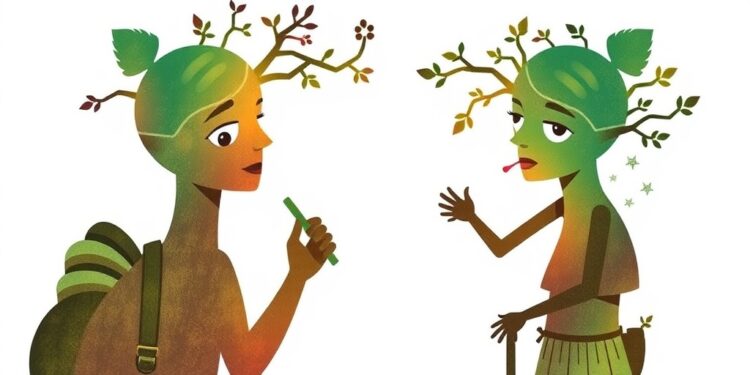Scientists have long relied on traditional methods of communication to share their research findings, often resulting in a disconnect between the complexities of scientific knowledge and the realities faced by the general public. As a consequence, critical issues such as climate change and biodiversity loss remain shrouded in jargon and restricted to the confines of academic circles. Recent discussions among researchers at the University of Exeter have sparked a paradigm shift, emphasizing the need for scientists to adopt innovative storytelling techniques that can better engage and inspire action from audiences beyond their immediate academic communities.
The conventional approach to scientific communication is characterized by objective, impersonal language found in peer-reviewed journals. This methodology, while ensuring accuracy and precision, does little to convey the urgency or emotional stakes involved in environmental issues. For many scientists, the frustration and helplessness stemming from inaction on pressing ecological matters feel overwhelming. According to Professor Karen Anderson, this emotional detachment is not only limiting for the scientists themselves but also hinders the potential for their vital findings to motivate necessary societal change. By encouraging researchers to express their love and passion for the natural world, a more accessible narrative can emerge.
The current model of scientific writing, rooted in the practices of 17th and 18th-century “gentleman scientists,” has served its purpose, yet it is increasingly seen as inadequate for addressing contemporary challenges. Dr. Katherine Crichton highlights that the stakes of the climate and biodiversity crises are far too high to restrict meaningful discourse to academic audiences alone. Engaging the public and inspiring broader concern requires a shift in how scientists present their findings, enabling them to break free from the constraints of traditional communication formats.
The researchers from the University of Exeter suggest that narratives infused with personal experiences can humanize the often seemingly detached world of science. These stories can serve to illuminate the dedication and struggles of researchers, as well as the interconnectedness of humans and the ecosystems they study. This approach recognizes that sharing personal narratives can inspire empathy and foster a deeper understanding of environmental issues. By embracing the role of storyteller, scientists can transform their work into compelling calls to action, ultimately galvanizing public interest and engagement.
Additionally, the researchers propose new strategies to enrich scientific communication. This includes incorporating multimedia elements like video and interactive content to draw audiences into the narrative. They argue that embracing the “art of storytelling” allows for a more profound connection with audiences, and platforms for sharing these stories should complement traditional scientific publications. Highlighting the behind-the-scenes processes of scientific research can mimic the engaging formats found in popular nature documentaries, thus rendering complex information accessible to a broader audience.
The call to action is clear: existing methods of communicating science have failed to mobilize the will to combat climate change effectively. Dr. Crichton emphasizes that human beings are inherently motivated by stories, and many scientists possess a wealth of rich, untold stories that could resonate with the public. An urgent need now exists for scientists to rethink their communication strategies, utilizing emotional narrative techniques that encapsulate the gravity of their research and its implications for society and the planet.
Moreover, including personal author biographies that extend beyond bare-bones factual curricula vitae can also encourage greater human connection to research. Sharing personal motivations, experiences, and relationships with their subjects can enhance the overall narrative and authenticity of the scientific message. By doing so, the barriers between scientists and the public can begin to diminish, fostering an environment in which ecological concerns are viewed as collective responsibilities rather than isolated issues.
Professor Angela Gallego-Sala’s insights on the emotional connection that scientists have to the ecosystems they study further underscore the importance of narrative in communicating research. It is crucial for the scientist to shed the mask of objectivity that often feels compelled by academic norms. As scientists allow their identities and motivations to surface, they can cultivate relatable stories that capture the public interest and underscore the urgent need for action.
The researchers also stress that this shift towards storytelling in science is not merely an artistic endeavor; it has practical implications for fostering actionable change. Telling effective stories about ecological crises can mobilize communities, influence policy, and facilitate a more comprehensive understanding of environmental issues among the public. For this reason, it is imperative that scientists give due consideration to how they communicate their findings, engaging audiences on both emotional and intellectual levels.
As the discourse around scientific storytelling continues to evolve, a collective understanding is emerging regarding the power of narrative in inspiring change. The researchers from Exeter are leading the way by presenting their views on how storytelling can reshape the future of environmental science communication. Their experiment with storytelling methods constitutes a necessary adaptation to the challenges of climate and biodiversity loss, empowering both scientists and the public to engage in the urgent work of environmental protection.
In conclusion, the urgency of the climate and biodiversity crises demands a radical rethinking of how scientific narratives are constructed. The push for emotional storytelling amongst researchers at the University of Exeter represents a crucial step towards bridging the gap between scientific knowledge and public action. By harnessing the art of storytelling, scientists can not only share their findings more effectively but also inspire a global movement towards action that protects the planet for future generations.
Subject of Research: Communicating Environmental Science
Article Title: We are storytelling apes: experimenting with new scientific narratives in a time of climate and biodiversity collapse
News Publication Date: 2-Apr-2025
Web References: http://dx.doi.org/10.1002/pan3.70027
References: N/A
Image Credits: N/A
Keywords
storytelling, environmental science, climate change, biodiversity, communication, public engagement, research narratives, academic writing, human connection.




